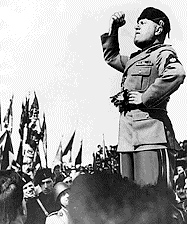

Mussolini, pronounced moo suh LEE nee or pronounced moos soh LEE nee, Benito, pronounced beh NEE toh (1883-1945), founded fascism and ruled Italy for almost 21 years, most of that time as dictator. He dreamed of building Italy into a great empire, but he led his nation to defeat in World War II (1939-1945) and was executed by his own people.
Early life. Mussolini was born in Dovia, near Forli, in northeastern Italy. He earned a teaching certificate and briefly taught in an elementary school. From 1902 to 1904, he lived in Switzerland, where he increased his knowledge of socialism. Mussolini served in the Italian military in 1905 and 1906, and then taught school again and became a local socialist leader. In 1909, he went to Trent, Austria (now Trento, Italy), and worked for a socialist newspaper. But Austrian authorities expelled him from Austria for revolutionary activities.
In 1912, Mussolini became editor of the Italian Socialist Party's official newspaper. In this paper, he supported Italian involvement in World War I (1914-1918). Many socialists criticized this position. He then resigned as editor and, in November 1914, founded his own newspaper, Il Popolo d'Italia, in which he urged Italy to enter the war against Germany and Austria-Hungary. Later that month, the Socialist Party expelled Mussolini. Italy entered the war in 1915, and Mussolini served in the army until he was wounded in 1917.
Fascist dictator. In 1919, Mussolini founded the Fasci di Combattimento (Combat Groups). This movement appealed to war veterans with a program that supported government ownership of national resources and that put the interests of Italy above all others. In 1921, he transformed the Fasci into the National Fascist Party, adopting a more conservative program to gain the support of property-owning Italians. The Black Shirts, armed squads who supported Mussolini, used violence to combat anti-Fascist groups. In 1922, the Black Shirts staged a March on Rome and forced King Victor Emmanuel III to appoint Mussolini prime minister.
In 1925, Mussolini declared a dictatorship. He abolished other political parties and imposed government control on industry, schools, and the press and police. In 1929, he signed agreements that settled long-standing disputes between the government and the Roman Catholic Church. He also sought to make Italy a corporate state, in which the government would help resolve disputes between employers and workers. The powerful Mussolini was called Il Duce (The Leader).
Foreign policy. Mussolini sought to make Italy a major power and to create an Italian colonial empire. He invaded and conquered Ethiopia in 1935 and 1936. But this action was condemned by Britain, France, and other countries and drove Mussolini toward an alliance with the German dictator, Adolf Hitler. In 1936, he joined Hitler in sending troops to fight in the Spanish Civil War in support of the rebel leader General Francisco Franco. In 1939, Italy conquered and annexed Albania.
World War II began in 1939, and France and Britain declared war on Germany. After Germany had almost conquered France in 1940, Mussolini entered the war and invaded France. A few days later, France surrendered. But Mussolini's troops soon suffered serious setbacks in North Africa and Greece. They met even stronger opposition after the Soviet Union, and later the United States, joined the war against Italy and Germany.
In July 1943, members of the Italian government deposed Mussolini and restored authority to the king, who then had Mussolini arrested. Mussolini was rescued by German commandos and became the head of a puppet government in northern Italy. In the spring of 1945, the German forces in northern Italy collapsed. On April 27, 1945, Italians opposed to fascism captured Mussolini as he attempted to escape to Switzerland. The next day, he was shot to death.
Contributor: Philip V. Cannistraro, Ph.D., Prof. of History, Drexel Univ.